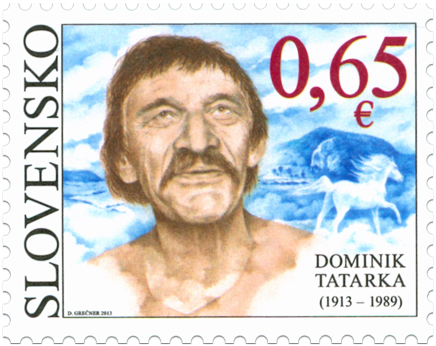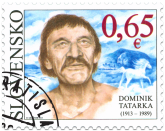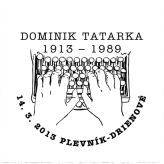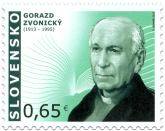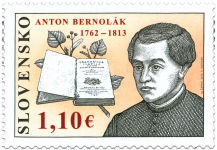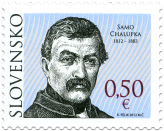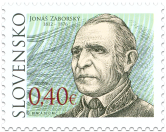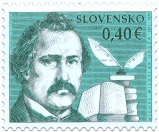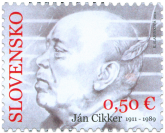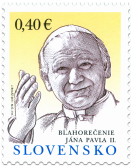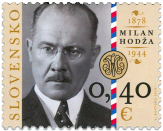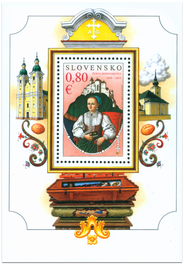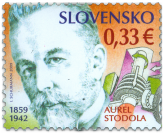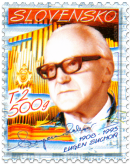535 Date of issue
14.03.2013 Face value
0.65 € Sell price
0.65 €
Dominik Tatarka (March 14, 1913 – May 10, 1989) a prose writer and author of fine art, cultural and social essays, is one of the most significant representatives of the 20th century Slovak culture. His first collection of short stories called V úzkosti hľadania (1942) is characterised by a trembling feeling of existential anxiety arising from tragic human fate. The short story called Panna zázračnica (1944) represents Tatarka’s farewell with joyous iconoclasm of youth, while his short story called Farská republika (1948) tells a story of individual fight for preservation of humanity during inhumane wartime.
At the beginning of the 1950s, Tatarka matched early romantic idea of community full of gregariousness with a communist regime (Družné letá 1954, Radostník 1954). However, shortly after, he pointed out at harmfulness of this illusion in a grotesque text named Démon súhlasu (1963). In the short stories Rozhovory bez konca (1959) and Prútené kreslá (1963), he returned back to existential questions of human being, and in collections of essays Proti démonom (1968) and Kultúra ako obcovanie (1996), he formulated his concept of culture.
After 1968, Tatarka concentrated on autobiographical texts in which he interconnected fragments of his daily experience, moods, letters, meditations and reflexions. They were published in parts in form of samizdat and also in exile as Listy do večnosti (1988), Sám proti noci (1984) and Písačky (1984). They were as well published as a whole in a trilogy called Písačky (1998). In 1988, interviews with Tatarka in a form of a monologue with a title Navrávačky were also published. These texts represent an autobiographical axis of his samizdat writings after he was pushed away from public life by the regime.
Founded on Ancient and Christian traditions and national myth of worshipping fundaments of Tatarka’s imaginary museum of modern culture have become an independent individual, legally competent citizen and sovereign state. After occupation in 1968, Tatarka applied the idea of Civitas Dei to a small community of Czechoslovak dissent and to meetings and fights based on astonishment from female, physically erotic relationship and male friendship and solidarity. Through the lived concept of the independent human being and outcome of his artistic work as a story of life existence Dominik Tatarka remains an exceptional author of intensity of fatal, tragic and melancholic moments of human existence in the Slovak culture.
Peter Zajac
Show lessSimilar products
543 Date of issue
28.06.2013
523 Date of issue
03.10.2012
512 Date of issue
27.02.2012
511 Date of issue
03.02.2012
504 Date of issue
22.09.2011
502 Date of issue
29.07.2011
496 Date of issue
29.04.2011
473 Date of issue
16.04.2010
456 Date of issue
02.06.2009
452 Date of issue
17.04.2009
418 Date of issue
17.04.2008
419 Date of issue
17.04.2008
© 2024 POFIS - Postal philatelic service. All rights reserved

